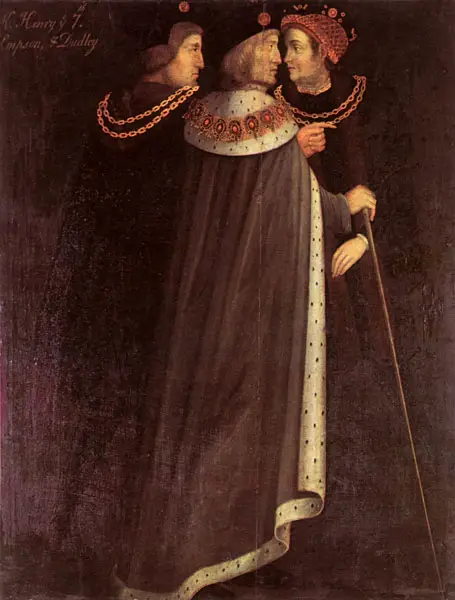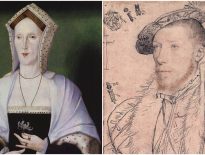14 August
1473 – Birth of Margaret Pole, Countess of Salisbury, the daughter of George, Duke of Clarence, brother of Edward IV, and his wife Isabel Neville. Margaret was born at Farley Castle, near Bath. Click here to read more about her.
1479 – Date given as the birthdate of Katherine of York (Katherine, Countess of Devon), at Eltham Palace. Katherine was the daughter of Edward IV and Elizabeth Woodville, and she married Sir William Courtenay, the future Earl of Devon, in 1495.
1513 - William Parr, Marquis of Northampton and brother of Queen Catherine Parr, was born. Click here to read more about him.
1539 – Death of Sir Peter Edgcumbe. Edgcumbe served as Sheriff of Devon and Cornwall at various times between 1494 and 1534, was at the 1513 Battle of the Spurs and was present at the Field of Cloth of Gold in 1520.
1620 – Burial of Katherine Hastings (née Dudley), Countess of Huntingdon, in Chelsea Old Church. Katherine was the daughter of John Dudley, Duke of Northumberland, and his wife Jane, and was married to Henry Hastings, 3rd Earl of Huntingdon. Katherine was buried in her mother's tomb.
15 August
1544 – Birth of Sir Peter Young, Scottish diplomat and tutor to the young James VI of Scotland, at Dundee.
1551 – Robert Dudley, the future Earl of Leicester, and his friend Barnaby Fitzpatrick, 2nd Baron Upper Ossory, were appointed as Gentlemen of Edward VI's Privy Chamber.
1552 – Death of Sir Anthony Wingfield, soldier and administrator, in Bethnal Green. He was buried at Stepney. Henry VIII named Wingfield as an Assistant Counsellor of his will and Wingfield served Henry's son, Edward VI, as Vice-Chamberlain of the Household, Comptroller of the Household and Exchequer Chamberlain.
1563 – Death of Thomas Argall, administrator in the reigns of Henry VIII, Edward VI, Mary I and Elizabeth I, at his house in Ivy Lane, London. He was buried in St Faith's under St Paul's. Argall is described by his biographer J.D. Alsop as being “one of the most prominent royal administrators of clerical revenue and accounts” between 1540 and his death in 1563.
1588 - Catholics Robert Wilcox, Edward Campion, Christopher Buxton and Robert Widmerpool were examined. Campion, Wilcox and Buxton were found guilty of being Roman Catholic priests and Widmerpole was charged with giving aid to a priest. They were executed by being hanged, drawn and quartered at Oaten Hill in Canterbury on 1st October 1588.
1594 – Burial of Thomas Kyd, playwright, at St Mary Colechurch in London. Kyd is known for his play “The Spanish Tragedy” (c.1587), and some scholars believe that he wrote a “Hamlet” play before that of William Shakespeare.
1603 – Burial of Lady Mary Scudamore (née Shelton), a member of Elizabeth I's Privy Chamber and one of her favourite sleeping companions, at Home Lacy in Herefordshire. In 1584, Mary, Queen of Scots, accused Elizabeth I of breaking one of Mary Scudamore's fingers in a fit of temper after finding out about Mary's marriage to Sir John Scudamore.
1610 – Death of Peter Lowe, surgeon and founder of the Royal College of Physicians and Surgeons of Glasgow, as it is now known, in Glasgow. He was buried at Glasgow Cathedral.
1612 – Death of administrator Sir Michael Hickes at Ruckholt in Essex from a “burning ague”. He was buried at Leyton Church in Essex. Hickes served William Cecil, Lord Burghley, as one of his principal secretaries and was close friends with Burghley's son, Robert Cecil.
16 August
1513 - The Battle of Spurs took place at Guinegate (Enguinegatte) in France. It was a battle between the English, backed by Imperial troops, and the French, and is called the Battle of the Spurs because the French knights, taken by surprise and realising that they were outnumbered and outmanoeuvred, fled on horseback, their spurs glinting in the sunlight.
1533 (16th or 17th August) – Death of Thomas Skevington, Abbot of Beaulieu and Bishop of Bangor, at Beaulieu. His body was buried at Beaulieu and his heart buried on the north wall of Bangor Cathedral, before the picture of St Deiniol.
1549 – Death of Sir Christopher More, landowner and administrator. He was buried in St Nicholas's Church, Guildford, in the Loseley Chapel. More was a JP and Sheriff during the reign of Henry VIII and was appointed, in 1539, to the guard of honour prepared for Anne of Cleves in late 1539.
17 August
1498 – Death of John Scrope, 5th Baron Scrope of Bolton. It is likely that the Yorkist Scrope fought on Richard III's side at the Battle of Bosworth in 1485, but escaped punishment by the victor, Henry VII. He was imprisoned in 1487 after supporting the pretender Lambert Simnel, but was released, and by 1492 was loyal to Henry VII.
1510 - Henry VII's chief administrators, Sir Edmund Dudley and Sir Richard Empson, were beheaded on Tower Hill after being found guilty of treason. See 18 July 1509 - Edmund Dudley convicted of treason for more on this.
1517 – Death of Andreas Ammonius (also known as Andrea Ammonio and Andrea della Rena), the Italian humanist scholar, cleric and poet, from sweating sickness during the night of the 17th/18th. He died in London and was buried at St Stephen's, Westminster. He served Henry VIII as Latin Secretary and received various church offices, including the Canonry and Prebendary of St Stephen's, Westminster. Ammonius also served the papacy as sub-collector of taxes in England.
1545 – Death of Thomas Poynings, 1st Baron Poynings, of dysentery while serving Henry VIII as Lieutenant of Boulogne.
18 August
1536 – Baptism of William Borough, explorer and naval officer, at St Mary's in Northam, Devon. Borough served Elizabeth I as Comptroller of the Queen's Ships.
1562 – Death of John Mordaunt, 1st Baron Mordaunt of Turvey, politician, peer and member of Henry VIII's council. He died at his home at Turvey, in Bedfordshire, and was buried in the church there.
1572 – Marriage of Henry III, King of Navarre (future Henry IV of France), and Margaret of Valois at Notre Dame Cathedral in Paris. The aim of the marriage was to unite the Bourbon and Valois families, and also to bring peace between the Catholics and Huguenots. The St Bartholomew’s Day Massacre of the Huguenots took place just six days after the wedding.
1587 - The first European Christian was born in the New World. Virginia Dare was the daughter of Ananias Dare and his wife, Eleanor, daughter of Governor John White. She was born in the Roanoke colony, in what is now North Carolina, just days after the arrival of the colonists on Roanoke Island. Virginia was baptised the following Sunday. Click here to read more about Roanoke.
19 August
1531 – Burning of Thomas Bilney, Protestant martyr, at Lollard's Pit, just outside Bishopsgate. Although he was burned as a heretic, he actually denied his reformist views and affirmed his Catholic faith at his execution.
1551 - Princess Mary, the future Mary I, wrote to her brother Edward VI regarding the instructions the officers of her household were given about forbidding her chaplains to say Mass and any of her household to hear Mass. Click here to read more.
1561 - At six o'clock in the morning, Mary, Queen of Scots landed at Leith harbour, in Scotland, the country of her birth. The reason for her return to her homeland was the death of her husband, Francis II, King of France.
1578 – Death of John Harpsfield, humanist, scholar and Roman Catholic priest, in London. He was buried in St Sepulchre Church, London. Harpsfield is known for his leading role in the Marian persecutions of Protestants and his nine sermons, which appear in Edmund Bonner's 1555 “Homilies”.
1591 – Death of Welsh clergyman and Bible translator Thomas Huet at Tŷ Mawr, Llysdinam, Brecknockshire. He was buried in the chancel of Llanafan Fawr church. Huet helped Richard Davies and William Salesbury translate the “New Testament” into Welsh in 1567.
1601 – Death of William Lambarde, writer, antiquary and lawyer, at Westcombe in East Greenwich. He was buried in St Alphege Church, East Greenwich, but in 1710 his monument was moved to the Lambarde chapel in St Nicholas's Church, Sevenoaks. Lambarde's works included his 1570 “Perambulation of Kent”, the 1581 “Eirenarcha: or of the Office of the Justices of Peace” and the 1591 “Archeion, or, A Discourse Upon the High Courts of Justice in England”.
20 August
1509 – Birth of Sir William Stanford (Staunford), judge and legal writer. Stanford served Mary I as one of her queen's Sergeants, and is known for his legal books, “Les plees del coron” (1557), on criminal law, and “Exposicion of the Kinges Prerogative” (1567)
1580 – Death of Sir George Bowes, soldier and administrator, at Streatlam, county Durham. He was buried in the family vault at Barnard Castle Church. Bowes served Elizabeth I as a member of the Council of the North and the Ecclesiastical High Commission for York, a Justice of the Peace and Sheriff, and as the Earl of Sussex's Deputy in co. Durham and Richmondshire, and Provost Marshal. Bowes was also chosen to escort Mary, Queen of Scots from Carlisle to Bolton Castle in 1568.
1588 - A thanksgiving service was held at St Paul's in London to give thanks to God for England's victory over the Spaniards. Click here to read more.
1589 – Marriage of James VI of Scotland and Anne of Denmark, second daughter of King Frederick II of Denmark, by proxy at Kronborg Castle, Helsingør, Denmark. James was represented by his ambassador at the Danish court, George Keith, 5th Earl Marischal.
1599 – Death of Sir Thomas Norris, soldier and Lord President of Munster, at his house at Mallow, County Cork, Ireland. Norris died from an injury to his jaw sustained in a skirmish with Thomas Burke and his troops in May 1599.
1610 – Death of courtier Edmund Tilney, censor of plays and Master of the Revels. He was buried in St. Leonard's Church, Streatham, London.
1648 (or 5th August) – Death of Edward Herbert, 1st Baron Herbert of Cherbury and 1st Baron Herbert of Castle Island, diplomat, philosopher and the author of “The Life and Raigne of King Henry the Eighth”. He was buried at St Giles-in-the-Fields, London.









Leave a Reply